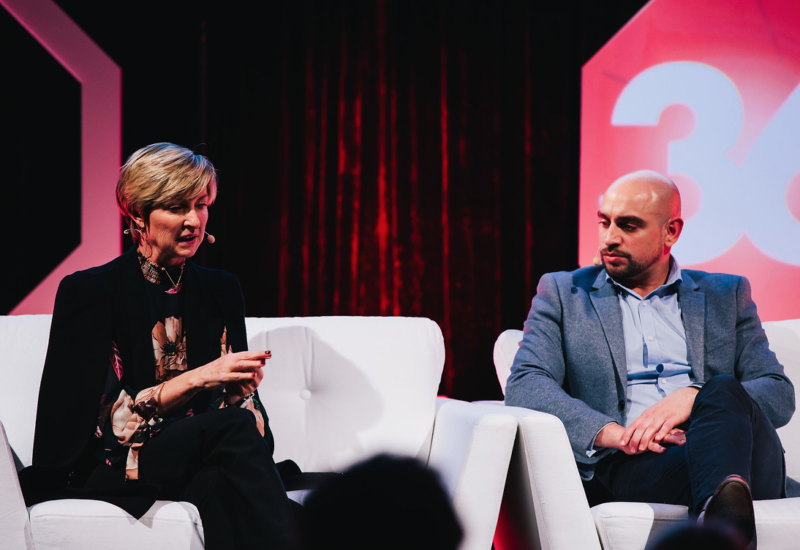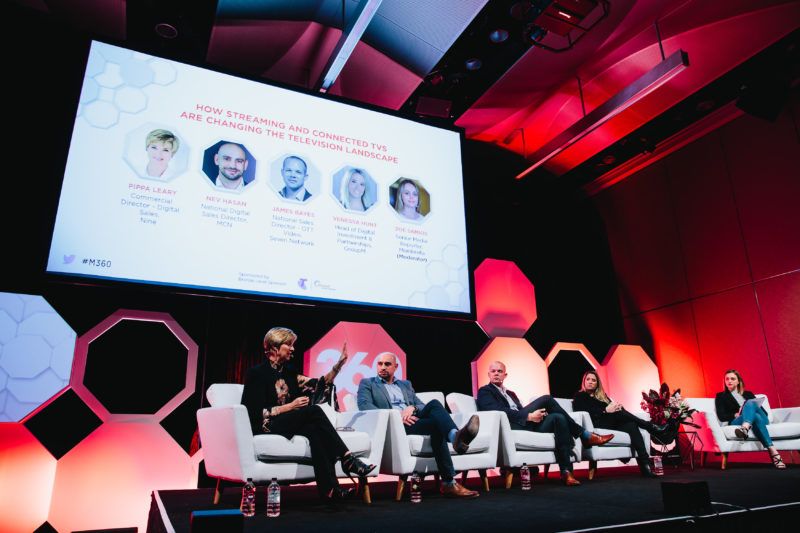
Ten’s audience not affected by compulsory Tenplay sign-ins
Ten’s decision to implement a compulsory sign-in on various programs through broadcast video on its demand platform (BVOD) platform, Tenplay, hasn’t affected audiences numbers, claims MCN’s digital sales boss.
At Mumbrella360 last Thursday, MCN’s Nev Hasan said despite Ten establishing compulsory log-ins for shows like Bachelor in Paradise, the network had not seen a change in audience figures.

Hasan said Ten never saw a drop off in member data, despite forcing users to sign in on certain programs
“There was always the fear that when you add another layer or don’t make it accessible or easy for people to get to the content that you are going to see your streams or user engagement drop off,” Hasan told the audience.
“They [Ten] never saw a drop off in member data. It was really a nice experience. People are quite used to it now, the whole marketplace has changed where people are expected to log in to receive – let’s be really honest, a free service – it’s sort of understood there’s a value exchange somewhere in that chain.
“Masterchef we looked at that again, and again the numbers haven’t been affected.”
Hasan, who spoke on a panel with Seven’s digital sales director of OTT Video, James Bayes, Nine’s commercial director for digital sales, Pippa Leary, and Group M’s head of digital investments and partnerships, Venessa Hunt, added from a consumer perspective, the lack of complaints and no user drop off had been big achievements for the network.
“We aren’t doing anything out of the norm here, and one point we’re going to serve customised ads, more relevant ads, more recommendations. It all works holistically and how that works with additional data sets from MCN perspective, we have our own with SIA, how you combine that becomes a much more powerful thing,” he added.
Nine’s Leary said enforcing compulsory log-ins on all programming for the network’s BVOD platform, 9Now, “wasn’t as painful” as first thought.
“When we built 9Now, we built it off the very firm belief that people buy cars, breakfast cereals, not devices, not cookies. So we needed to get away from the cookie world as soon as we could. We knew that we needed to go towards people-based marketing, addressability and our very firm belief was you cannot bring in an addressable product to market if you do not have a lot of declared data and you cannot match it to a user log in.

Nine’s Pippa Leary said the ability to recognise and target consumers while they were watching 9Now marked the start of a ‘new era’
“The very premise of 9Now has always been being able to get to a position where we are able to target one to one. Today, the work on the 9User ID was completed and we can officially start doing that now.” For the first time you take the best of the big screen, the best of TV, which is its ability to build brands through emotional video and through sound, but then you take the best of digital, and that is the ability to target, to do attribution.”
Leary said the ability to recognise and target consumers while watching the platform is really a “new era”. She added the opportunities with BVOD have also allowed the network to target new demographics and consume content in different ways. That led to the commission of Love Island Australia, she said.
“What we see at Nine is that on demand binging behaviour was established by Netflix and Stan and the subscription video on demand services – people learned you could get what you wanted when you wanted,” she said.
“That led to the commissioning of Love Island. From 9am till 4pm suddenly we saw these huge amounts of demand coming in.
“For Channel Nine, suddenly we have this youth demo we’ve never seen before.
“It’s a completely different way of thinking how you commission, how you market and how you monetise.”
Unlike Nine and Ten, Seven doesn’t have any compulsory log ins, preferring to take a “user-centric approach”. For Seven’s Bayes, creating a user experience or member benefits program allows for transparency. That’s helped Seven established 3m OTT users in April alone, he said.
Bayes said while he agreed the industry was moving into an age of “addressability” and targeting, it was better to ask users for data, as opposed to forcing them to hand it over. It does mean however, that Seven does not do addressable advertising in the same way as its counterparts.

The panel (L-R): Nine’s Pippa Leary, MCN’s Nev Hasan, Seven’s James Bayes and Group M’s Venessa Hunt
“This is a terminology thing. For us, addressable TV and what we announced at the all fronts at the backend of last year was that we were doing dynamic-ad insertion in a live stream. The simplest way to think about that is everything that everybody has grown to know and love about how you target audiences on BVOD, we can now do in a live stream,” he said.
“It’s a combination of first, second and third party data. You’d be amazed at if you create a user experience that incentivises people to want to log in, you’d be amazed at how many people actually will, even if you don’t force them to do it so we do have a very strong third party data proposition as well as some significant second party data partnerships.”
Group M’s Hunt said the next big challenge was making the BVOD experience easier for advertisers.
“The focus previously, and not wrongly, is actually on the consumer,” Hunt said.
“We have a lot to do with the advertising products inside of that. We’ve alluded to the fact the consumption is different and that we’ve taken the same ad experience and chucked it in the same environment. There’s a lot to do from an advertising perspective and a lot to do from a product perspective to make sure that that is not an experience that will piss people off.”
Seven’s Bayes added killing the term “catch-up” was also essential in helping advertisers understand the new platforms.
“It’s just such a limiting paradigm for what these products are, it’s not just about catching up on something you’ve used previously. It’s fundamentally a different way of watching. BVOD as an umbrella term is a good way to harness all of those different viewing behaviours. Catch up is a term that’s floated around the industry for a number of years and it’s really limiting.”



It’s affected my viewing numbers. I just don’t use it anymore.
The world knows that Ten is up shits creek!
Bye bye tenplay. Won’t be signing up, they can get stuffed